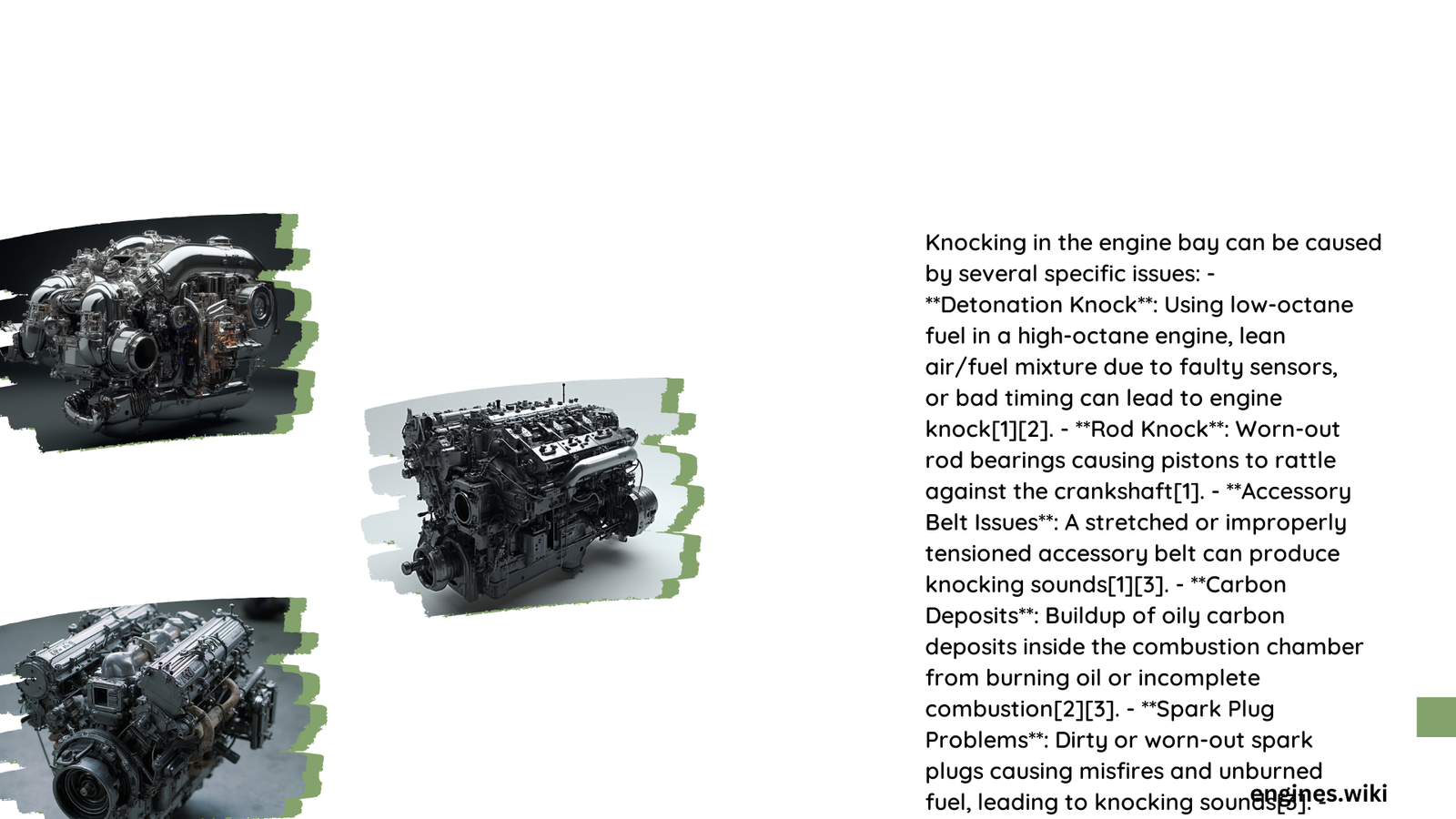Engine knocking is a serious issue that can indicate various problems within your vehicle’s engine bay. This persistent metallic sound, often described as a ‘pinging’ or ‘tapping’, occurs when the air-fuel mixture in the cylinders detonates prematurely or unevenly. Knocking can lead to significant engine damage if left unaddressed, potentially resulting in costly repairs or even engine failure. Understanding the causes, proper diagnosis techniques, and effective solutions for engine knocking is crucial for maintaining your vehicle’s performance and longevity.
What Are the Common Causes of Knocking in Engine Bay?
Engine knocking can stem from various mechanical and environmental factors:
Mechanical Causes:
- Improper Combustion Process
- Early combustion due to carbon buildup
- Lean air/fuel mixture
-
Advanced ignition timing
-
Internal Mechanical Problems
- Excessive clearance in connecting rod bearings
- Defective main crankshaft bearings
- Cracked or broken flywheel or flex-plate
- Worn water pump bearing
-
Failed or loose timing belt tensioner
-
Low Oil Level or Quality
-
Insufficient lubrication leading to increased friction
-
Worn Bearings
-
Excessive wear between crankshaft and cylinders
-
Carbon Deposits
- Buildup in cylinders increasing compression
Environmental Causes:
- Engine Temperature
-
Overheating causing premature ignition
-
Fuel Quality
-
Low octane gasoline leading to pre-ignition
-
Exhaust Gas Recirculation (EGR) System
- Malfunctioning EGR causing lean mixture and increased temperatures
How to Diagnose Knocking in Engine Bay?

Proper diagnosis of engine knocking requires a systematic approach and the right tools:
Required Tools:
- Multimeter
- Compression Test Kit
- Knock Sensor
- Fuel Pressure Test Kit
- Sound Frequency Analysis Tools
Step-by-Step Diagnostic Process:
- Initial Assessment (15-30 minutes)
- Listen for knocking sound characteristics
-
Check oil level and quality
-
Visual Inspection (30-60 minutes)
-
Examine spark plugs, fuel injectors, and other components
-
Compression Test (30-60 minutes)
-
Measure compression in each cylinder
-
Fuel System Check (30-60 minutes)
-
Test fuel pressure and inspect fuel pump and filter
-
Ignition System Check (30-60 minutes)
-
Verify spark plug firing and ignition timing
-
Knock Sensor Check (15-30 minutes)
- Ensure proper functionality and signal transmission to ECU
What Are Effective Troubleshooting Methods for Engine Bay Noise?
To effectively troubleshoot engine knocking, follow these procedures:
- Check Oil Level and Quality (10-15 minutes)
- Inspect Spark Plugs (30-60 minutes)
- Check Fuel System (30-60 minutes)
- Check Ignition Timing (30-60 minutes)
- Check for Carbon Deposits (30-60 minutes)
- Check Bearings and Internal Components (1-2 hours or more)
Potential Repair Costs:
| Repair/Replacement | Estimated Cost |
|---|---|
| Oil Change | $20-$50 |
| Spark Plug Replacement | $100-$300 |
| Fuel System Repair | $200-$1,000 |
| Ignition Timing Adjustment | $50-$200 |
| Carbon Deposit Cleaning | $50-$200 |
| Bearing Replacement | $500-$2,000+ |
How to Resolve Knocking in Engine Bay?
To resolve engine knocking, consider the following solutions:
- Use High-Octane Fuel
-
Prevents premature ignition
-
Replace Spark Plugs
-
Ensure correct heat range and gap
-
Clean or Replace Fuel Injectors
-
Improves fuel delivery and combustion
-
Adjust Ignition Timing
-
Prevents early combustion
-
Replace Worn Bearings
-
Eliminates mechanical knocking
-
Use Fuel Injector Additives or Cleaners
- Removes carbon deposits
Expected Outcomes:
- Reduced engine noise
- Improved engine performance
- Increased engine longevity
By following these diagnostic steps and implementing the appropriate solutions, you can effectively address knocking in your engine bay, ensuring optimal performance and longevity of your vehicle’s engine.
